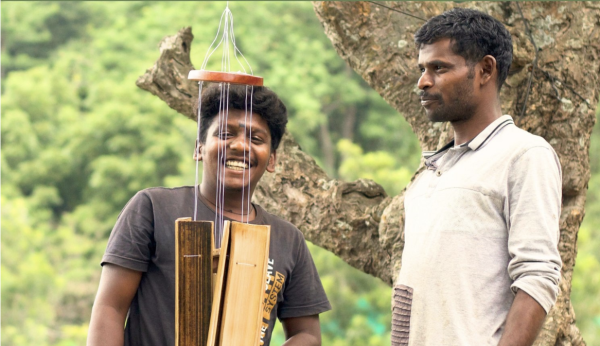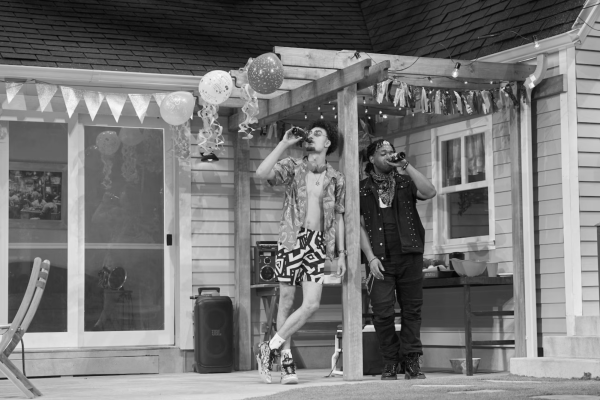OMTA’s Chicago Reflects on Production’s Past, Packs House
Last weekend saw the full run of the Oberlin Musical Theater Association’s final musical of the 2021–22 academic year, Chicago. The show ran from Friday, May 13 to Sunday, May 15 in Wilder Main Space, and was met with extreme enthusiasm from the student body, illustrated by the unprecedented turnout.
Director and College third-year Maeve Hogan had low expectations for audience turnout and was far more focused on finding her own satisfaction through the creative process.
“I thought I knew what it was going to look like, and I knew that I needed to find my fulfillment in the work rather than the audience turnout,” she said. “Then, we were selling tickets in Mudd [Center]. We started selling them at 3 p.m. with 100 tickets for each show. I showed up at 4 p.m. the first day, and all but six tickets had been sold. So that kind of shook up my world.”
As a result, the team decided to add an additional performance in the form of an invited dress rehearsal so that friends and family who wanted to attend would have the chance to do so. When all of the tickets for that performance were reserved, they opened it up to the public, resulting in a full house of 100 people — it was an opening night that arrived one day early.
Though shocking to the team, this reception from the student body was extremely gratifying.
College first-year Nova Gomez played Roxie, the show’s murderous protagonist, and she remembers the excitement the cast felt during the surprise opening night with great fondness.
“The audience was so responsive to everything,” she said. “In between every number, all of us were backstage going, ‘Oh my god, do you hear how loud they are? This is crazy!’”
Attendance was not the only special thing about Hogan’s Chicago. As a part of this production, Hogan and her team sought to steer themselves away from certain unsavory elements of the show’s history and instead toward a piece that could be better appreciated by a modern audience.
In particular, the group wanted to adapt the choreography of the production, which was originally directed and choreographed by Bob Fosse, to better represent their own voices as a cast and crew.
“It made me uncomfortable to think about doing a show that was about sex and the exploitation of female bodies while catering to the original vision of the show that was created by a sexual predator,” Hogan said. “So myself and the rest of the creative team and the cast were having conversations about how to make the rehearsal room a safe space for exploration and vulnerability, especially with potentially scary or traumatic issues. We thought about ways to reclaim the source material and make it meaningful for contemporary audiences — specifically, for young, digitally minded, socially aware Oberlin students.”
This emphasis on the comfort of the performers was greatly appreciated by the cast.
“I really liked the way that comfort was addressed,” Gomez said. “Every single step of the way, they were making sure that everyone was comfortable with everything, and I just think that’s such a better approach to take in life. It’s such a nice thing.”
In ensuring that the team felt comfortable and capable of performing in a way that they enjoyed, it seemed that there was greater opportunity for everyone involved to bond and have fun with the production process.
College third-year Anna Jefferis, who played Velma in the show, found that her relationship with and appreciation for her castmates was the highlight of her experience.
“My favorite numbers were not the ones I was in,” she said. “I think watching my fellow cast members perform, … it just pushes you to do your very best, but it’s also just awesome to share a performance space with such talented people.”
Music director and College third-year Ethan Smith-Cohen also held a deep sense of admiration for all of the talented people involved in the show’s production.
“It was a wonderful production to work on,” Smith-Cohen said. “The creative team was great, and we really put on a magnificent show. I’m really grateful for the actors, the amount of work they put in, and the pit orchestra, I’m really, really happy about. They sounded really good and were honestly the best pit orchestra that I’ve had the pleasure to work with. It was so exciting to learn from them as much as to teach them the Chicago score.”
Hogan and her team shared an intense bond and love for this project, and as this year of theater comes to a close, she is now looking toward the future and all of the possibilities in store for OMTA and Oberlin student theater more broadly.
“The theater community — the Oberlin community — has been proving over and over again that student theater is an integral part of art on this campus,” she said. “And the art that we make ourselves as students provokes joy, love, understanding, and community, and it deserves attention, commitment, and celebration. We’ve created this momentum that deserves to be upheld by the campus community and by the departments that we work in so that current and future students can inherit and develop a creative community that is, necessarily, by and for students.”










